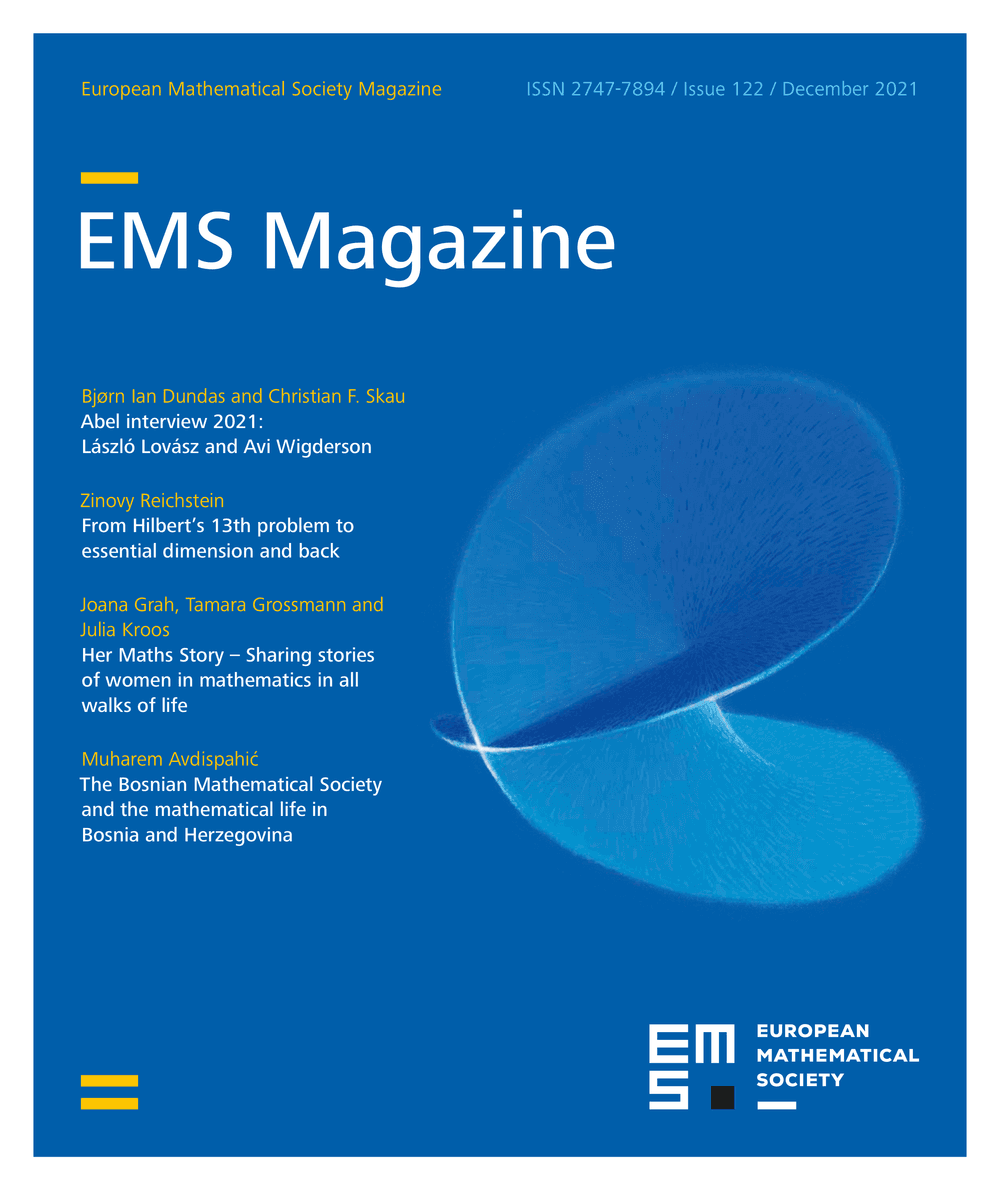Regularly presented by Jason Cooper and Frode Rønning
In this issue, with a contribution by Michèle Artigue
The Covid-19 pandemic: Challenging times for the mathematics education community
The Covid-19 pandemic started almost two years ago, turning our personal and professional lives upside down. As I wrote together with Ingrid Daubechies, former president of the International Mathematical Union, in the presentation of the plenary panel we coordinated at ICME-14 last July1Plenary panel 3 entitled Pandemic times: Challenges, responsibilities and roles for mathematics and mathematics education communities (www.icme14.org), this pandemic has brought mathematics to the forefront, in particular through the mathematical models used for understanding the course of the pandemic, and anticipating and weighting the possible consequences of different policy decisions. This has created a special responsibility for all those, mathematicians, mathematics educators and teachers, who play a role in helping students and the general public make sense of these models and their uses, and to understand more broadly what mathematical modelling is about, with all of its potential and its limitations. In his contribution to the panel, the Fields medallist Timothy Gowers stressed the importance of this mediating role accepted by many mathematicians beyond those directly involved in epidemiologic research, such as the South African mathematician Jean Lubuma, who also took part in the panel session.
Mathematics teachers and didacticians have endorsed this role, and they were certainly helped by the increasing importance given to modelling in mathematics curricula and educational research. However, for them, with the sudden transition to distance and online teaching, the pandemic represented first and foremost a disruption to the usual forms of teaching and interaction with their pupils and students. This disruption has dramatically exacerbated already existing educational inequalities, and Nelly León, a Venezuelan mathematics educator, especially developed this point during the panel session. But she also emphasized some positive dynamics generated by the pandemic: a radical evolution in the relationship with digital technologies; the production of a multitude of resources; new relationships between parents, students and teachers, and new solidarities. The responses to the call for papers launched by the journal Educational Studies in Mathematics in March 2020 also testify to the exceptional mobilization of teachers and researchers. The fourth contributor to the panel, David Wagner, who coordinated this editorial project with Man Ching Esther Chan and Christina Sabena, spoke of receiving 161 contributions from 36 countries; two special issues of the journal will soon be published (see [2 M. C. E. Chan, C. Sabena and D. Wagner, Mathematics education in a time of crisis—a viral pandemic. Educ. Stud. Math., DOI 10.1007/s10649-021-10113-5 (2021) ] for a global view).
Teachers’ testimonies and research studies show just how little we were prepared for this massive disruption. They allow us to identify research needs, for example the imperative need for research on online or hybrid teaching at all educational levels, not only at the levels of university and teacher education on which it has focused until now. Beyond that, there is a need for conceptual constructs allowing us to better approach the increasing complexity of human-digital artefacts relationships, as proposed by Borba [1 M. C. Borba, The future of mathematics education since COVID-19: Humans-with-media or humans-with-non-living-things. Educ. Stud. Math., DOI 10.1007/s10649-021-10043-2 (2021) ]. This pandemic experience also prompts us to question our research priorities, to ask ourselves what place we desire to give to the question of educational inequalities and to the study of the new or underestimated expressions of these inequalities that the pandemic has brought to light, and to question how, beyond simply bringing understanding, didactic research can actually support action more effectively than it has done so far.
As has been repeatedly emphasized, the pandemic is not an isolated crisis. At a time when, thanks to vaccination, we seem more able to control the pandemic evolution, schools and universities have reopened, and people plan to meet again face-to-face at conferences such as the forthcoming CERME next February, we must not forget this. Other crises are looming, undoubtedly much more complex, dangerous and lasting ones. To understand this complexity and contribute to the public debate on the political decisions envisaged or taken, quality mathematics education for all is more necessary than ever. Beyond the epidemiological modelling highlighted by the pandemic, there is an increasing need for probabilistic and statistical education including risk issues [3 N. Radakovic and E. Chernoff, Risk education. In Encyclopedia of Mathematics Education, edited by S. Lerman. 2nd ed., Springer, Cham, 754–756 (2020) ]. This education should enable students to question the “formatting” role played by mathematics in our societies, as called for by critical mathematics education [4 O. Skovsmose, Mathematics and crises. Educ. Stud. Math., DOI 10.1007/s10649-021-10037-0 (2021) ]. At a time when mathematics curricula are increasingly opening up to algorithmic and computational thinking, we cannot avoid thinking about how mathematical algorithms shape our world, for better or for worse. To face these challenges, collaboration between the mathematics and didactic communities is more important than ever, and in the panel session, Ingrid and I expressed our hope that this crisis situation would strengthen synergies between communities.
- 1
Plenary panel 3 entitled Pandemic times: Challenges, responsibilities and roles for mathematics and mathematics education communities (www.icme14.org)
References
- M. C. Borba, The future of mathematics education since COVID-19: Humans-with-media or humans-with-non-living-things. Educ. Stud. Math., DOI 10.1007/s10649-021-10043-2 (2021)
- M. C. E. Chan, C. Sabena and D. Wagner, Mathematics education in a time of crisis—a viral pandemic. Educ. Stud. Math., DOI 10.1007/s10649-021-10113-5 (2021)
- N. Radakovic and E. Chernoff, Risk education. In Encyclopedia of Mathematics Education, edited by S. Lerman. 2nd ed., Springer, Cham, 754–756 (2020)
- O. Skovsmose, Mathematics and crises. Educ. Stud. Math., DOI 10.1007/s10649-021-10037-0 (2021)
Cite this article
Michèle Artigue, ERME column. Eur. Math. Soc. Mag. 122 (2021), pp. 60–61
DOI 10.4171/MAG/55